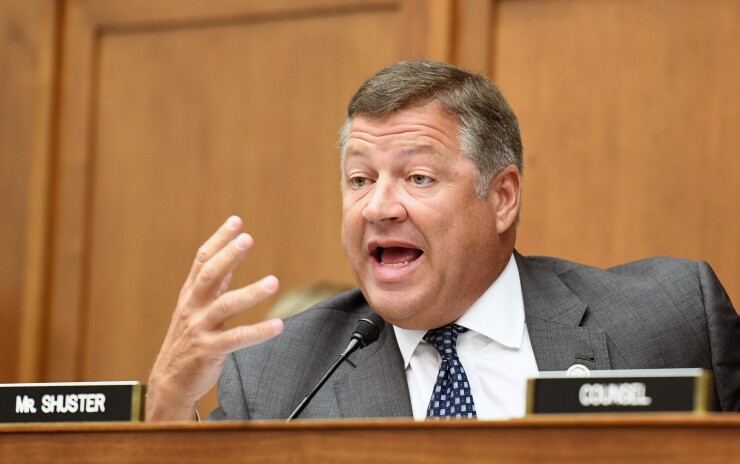WASHINGTON – The likelihood that Congress will be able to enact some kind of infrastructure legislation this year is slim to none, according to industry officials and lobbyists.
Lawmakers on both sides of the aisle want an infrastructure bill. Plenty of legislative activity is expected. Bills will be introduced. Hearings will be held. There may even be an attempt to enact some infrastructure provisions in an omnibus appropriations bill later this year.

But there’s no consensus on how to pay for a bill and there seems to be too little time to bridge the differing views and reach some agreement.
Senate Majority Whip John Cornyn, R-Texas, said as much on Tuesday, telling reporters, "I think it will be challenging. I certainly would be happy if we could, but we've got a lot of things to do, that being one of them, and I don't know if we will have time to get to that."
Congress is currently wrestling with whether to do something on guns in the wake of the mass shooting at Marjory Stoneman Douglas High School in Parkland, Fla. earlier this month. It also is weighing immigration issues and must vote on spending and debt limit legislation by March 23.
In addition, there are fundamental differences among infrastructure proponents as to what infrastructure legislation should contain.
Trump’s bill would generate a seismic shift in the way infrastructure is paid for, with the federal government taking far less responsibility and shifting the funding to state and local governments and the private sector.
The president’s fiscal 2019 budget proposes to eliminate or cut some of transportation and other programs such as community block development grants that state and local governments rely on for infrastructure funding.
There also seems to be a bit of a disconnect within the administration. D. J. Gribbin, special assistant to the president for infrastructure policy, has long been a proponent of public-private partnerships. But Trump has had questions about them. The president’s infrastructure plan promotes private investment, but doesn’t really promote P3s by name.
The U.S. Chamber of Commerce, transportation and state and local groups want to see fuels taxes increased, with the revenue used to shore up the Highway Trust Fund, which historically has been the main source of federal highway and mass transit grants made to state and local governments. But Republican leaders in the House and Senate oppose the idea of a gas tax hike.
Democrats want far more direct federal spending on infrastructure and have proposed their own $1 trillion plan.
In addition, Republican leaders in the House and Senate don’t appear to have any interest in taking action on a bill that would be costly, just after adding roughly $2 trillion to the federal deficit from the tax law changes enacted in December and the recent two-year budget that was struck -- especially with the approach of mid-term elections in November.
The November elections mean not much will be done legislatively after the summer, according to congressional aides.
President Trump sent his infrastructure plan to Congress on Feb. 12 and asked the lawmakers to come up with a bill. His plan calls for $200 billion of federal funds to be used to leverage $1.5 trillion in infrastructure investment.
The $200 billion would be divided into five areas: $100 billion for incentive grants for state and local governments that identify projects and revenue streams, such as property taxes or user fees that would pay for at least 80% of costs; $50 billion for grants to governors for rural infrastructure; $20 billion for expansion of private activity bonds and federal loan and credit assistance programs; $20 billion for transformative projects; and $10 billion for federal office building infrastructure.
The plan contained no provisions to pay for the spending.
While some Republicans and conservative groups support the plan, reaction to it from many infrastructure proponents and Democrats has run from lukewarm to adamantly opposed.
Much like Republican leaders in the House did during tax reform, the White House is putting out almost daily releases about the plan’s benefits and statements from supporters. Administration officials are holding meetings with lawmakers and industry groups, sources said.
Reps. Bill Shuster, R-Pa., chair of the House Committee on Transportation and Infrastructure, and Peter DeFazio, D-Ore., the ranking minority member on the panel, are working together on infrastructure legislation that they hope to have ready sometime before summer.
Shuster has announced he will not seek re-election in November and wants an infrastructure bill as part of his legacy.
But he has said that he first wants to deal with bills to reauthorize the Federal Aviation Administration and to renew the Water Resources Development Act.
He introduced an FAA bill – the 21st Century AIRR Act last June. It would privatize federal air traffic control and failed to get widespread support. The bill did not move past the committee.
The Water Resources Development Act, which must be renewed, mostly authorizes federal funds for new Army Corps of Engineers flood protection, harbor and coastal dredging, and seaport improvement programs.
The committee’s subcommittee on highways and transit has scheduled an infrastructure hearing for March 7, according to Bloomberg News. But congressional aides could not confirm that date.
The Senate Committee on Environment and Public Works has scheduled a hearing for Thursday on Trump’s infrastructure plan.
Sen. John Barrasso, R-Wyo., chairman of the committee, has been working on an infrastructure bill for months but agreed to hold off on introducing it until Trump released his plan.
Neither Shuster, DeFazio, nor Barrasso are likely to produce bills that are in line with Trump’s infrastructure plan, sources said.





